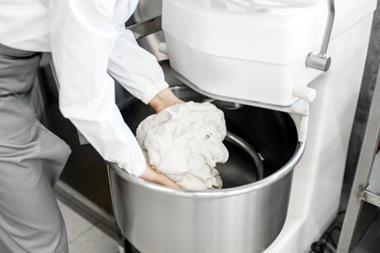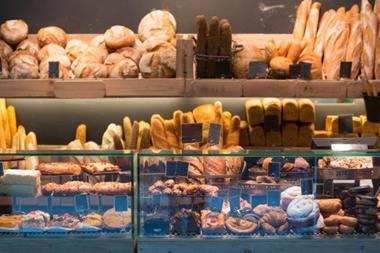Welcome to the next feature in The Bakery Project, a series exploring some of the ways to start or expand a bakery business. This month, advice on selecting the right site for your bakery or shop
When it comes to finding the perfect home for your bakery, it’s all about location, location, location.
In the absence of Kirsty and Phil, MD of Stephens Bakery André Sarafilovic suggests working closely with your local property agents. This, he believes, is key to getting the pick of the best premises.
“Location is everything. If you’ve got the products right, the offering right, but the same costs and hard work going into the wrong location, it’ll never work,” he says.
“Finding those locations is a challenge as there’s huge competition for the primary locations, and little for the secondary ones. If a shop is going up for cheap rent and is lying vacant, there’s probably a reason for it.
“Make contacts with your local property agents to make sure they’re looking out for you because by the time a ‘to let’ sign goes up, that means everybody else has passed on it,” he adds.
This will give you an edge, Sarafilovic notes, as agents frequently get in touch about upcoming sites, proposals for new developments as well as renovations by property developers, offering you the widest choice of options.
It paid off for Burns the Bread, which was in talks with a developer looking to build a new property that could house its bakery. However, the process took so long, the firm was offered a first look at another property in Somerton, which turned out to be “perfect”.
Many bakers choose to open up shop in their home town or neighbouring area – at least in the first instance – and branch further afield once the first location has proved itself. After all, a basic understanding of the area’s needs, demand and rival businesses will help.
But for those looking to expand, investing in people could pay dividends as Warrens Bakery’s head of franchise operations Andy Hulbert explains. “We don’t specifically choose areas, but pay careful attention to selecting the right franchise partner. We are looking for hungry entrepreneurs with the drive and mind-set to produce the highest-quality products.”
So, what should you be looking for when eyeing up potential properties for a bakery? And does the site need to have been used as a food retail premises previously or is any space fair game?
A blank canvas can have its advantages and will offer a broader range of properties to look at. Moreover, for some, it adds an interesting bit of backstory.
For example, Column Bakehouse’s first site in Plymouth’s Devonport Guildhall is situated in what used to be a morgue, while Cosson’s Bakery in Wickford, Essex found a new home in a former aquatic shop.
%%Quote_27%%
But opting for a non-food premises can create more work.
“The main problem we tend to see is where a shop doesn’t have three-phase electrics installed. That is only able to be installed by a mains electricity company and there’s usually an eight- to 12-week lead time on that at a great cost to the landlord or the owner of the building,” explains Ben Lord, buyer/estimator at Frimovel, a company that specialises in the design and shop-fit of bakeries.
Three-phase electricity offers more power and is needed for larger units such as commercial ovens. “If it is already a food shop, it will pretty much have three-phase guaranteed,” he adds.
Another hurdle to overcome for non-food premises is planning permission to turn it into one. While some find this a relatively straight forward process it can slow down a project.
“Moving into a non-food site isn’t too bad,” says Casey Stoddart, retail support manager at Burns the Bread, which opened its seventh site in Somerton last August. “We had to get planning permission to take the site from retail to food retail – the process took about a couple of months to get a decision.”
Burns the Bread sought advice from an agent on the process and appeared at a planning meeting to answer any questions that might arise from the community.
Ventilation and extraction also need to be taken into consideration – an issue social enterprise Column Bakehouse came up against at its aforementioned Guildhall site. The problem can be exacerbated by a site’s listed status.
“Both of our bakeries are in Grade 1 listed buildings,” explains Claire Burgess, head of enterprises at Real Ideas Organisation, which owns Column Bakehouse. “It’s really hard and not ideal, so you’re constantly having to adapt things. There are certain things you can’t do, such as attach things to the walls, but you just have to find your way around that and adapt your workflow to suit it.
“Our biggest problem with the Guildhall is extraction. We don’t have any extraction in the original Bakehouse, which makes things difficult, but we use the building itself to create natural ventilation.”
In addition, Column Bakehouse is limited to what can be created in the old morgue due to the tiles which cover the walls, dating back to the 1800s. Fried food, for example, is a no-go.
The intended use of a building will inevitably impact on how much power and ventilation is used, as well as the type of goods made.
Burns the Bread’s Somerton site, for example, bakes savoury pastries on-site, but bread is provided by its larger bakery on Glastonbury High Street. Column’s second site in Ocean Studios, Royal William Yard is more of a café set-up, with many products fulfilled by Guildhall.
“For growth, just replicating entire bakeries is very difficult and not cost-effective; you need to be also looking at that hub-and-spoke effect. Our second Bakehouse is just a café, so it can fit in a very small space because all of the product is coming out of an original hub,” says Burgess.
Access when refitting the space, and for deliveries, will also be required as Frimovel’s Lord notes a few “horror stories” of windows having to be taken out where the doorways haven’t been wide enough for the equipment and counters to fit through.
“Rear entrance loading is certainly advantageous for setting up, but also for deliveries. If this isn’t possible, a large double door at the front is always useful for getting the counters in,” he says.
Choosing a space that’s already fit for food retail doesn’t have to mean settling for someone else’s layout. Utilising it to fit your needs will benefit you in the long run – even if it costs more in the short term.
“You need to think about staff and customers, so the space doesn’t feel too cramped and constricted,” Lord says. “Sometimes we’ll do a refit of a shop, strip out the old counters and replace them with new ones and the customers are surprised at how much bigger the shop can be.”
%%Quote_26%%
Burgess at Real Ideas Organisation says the business has learned about the space needed for a bakehouse.
“Make sure you have a space that meets your current needs but also has the scope to expand as your business expands,” she adds. “Don’t limit yourself by thinking you need to go for the smallest and cheapest space.
“You need to be looking at moving forward and if you suddenly find within two years that you’ve outgrown your space it’s a very big investment to move everything into a larger space. Having a five or six-year plan to grow is very important.”
Similarly, how much seating, if any at all, will need to be thought about carefully. Again, this comes down to the planned purpose of the bakery, but seating comes with its own ramifications.
Different councils have different rules, notes Lord, but there comes a point at which planning and building regulations will require the bakery to have a toilet for customer use.
It’s a lot to take on board, but working with the local council and chamber of commerce, as well as specialist organisations and property agents, can ensure you get the right property for your needs.
Is this the right property for you?
If you get it right, starting your own bakery business can be a thrilling career choice. One of the most important points is finding the most suitable commercial property to operate from – even more so if the business has a retail-to-consumer element. For a thorough evaluation, ask yourself the following questions:
- Do the premises need any major renovations to fit your business requirements – does the property already have ovens and adequate units and work surfaces?
- How easy will the property make it for you to comply with food, health, fire and other safety regulations?
- Is it easily accessible for customers and workers who use public transport – how close is the nearest train station or bus stop?
- Does the location already get a lot of passing trade or are you likely to be the biggest ‘draw’ on the street (which might put a lot more pressure on your marketing and promotional efforts)?
- Are there any competitors trading nearby? Are those sites better or worse than yours?
- What will the insurance be? Obtain quotes from different suppliers to compare. The Federation of Small Businesses (FSB) runs its own insurance service to advise small businesses and find the right insurance for them.
- What will the business rates be? The council will be able to give you this information and also ask the council if you are eligible for small business rate relief.
- The condition of the property and the need for modernising – will you be able to trade from there in five or 10 years from now? A surveyor should do a condition report to help you determine this, but you’ll need to consider other factors such as storage facilities as you expand, washroom and eating facilities, etc.
- What is the business climate in the area? Consider talking to other traders in the same area to gain insight. Look at local council investment and infrastructure proposals, if any and compare them to plans for other areas to ensure you’re investing in a venue that’s going to remain vibrant and grow. Your area FSB representative would be a good source of information.
- Are there any delivery logistics restrictions? For example, how easy is to gain reasonable access to the property; are there any parking or thoroughfare limitations?
- What parking facilities are on offer (if relevant)? Depending on the nature of your business, it can be a significant advantage if you can offer customer parking. Or, if you are planning on offering a delivery service, you will need space for vehicle/s,
- Consider the operating costs of the premises – will they be too high to offer you an adequate profit? Ask detailed questions of the landlord and get quotes from different utility suppliers.
- Buy or lease? When you start looking for a commercial property, you will need to decide whether to buy it outright or rent it. Second, if you decide to follow the renting rather than the purchasing route, you face a further serious decision: for how long do you want to commit yourself? Taking a lease on premises is a serious business, as it is a binding contract in law. Take a lease for 10 years and you cannot simply walk away from it after three years if your premises prove unsuitable or your business fails to develop as you expected. It may prove very expensive to extricate yourself from your commitment in terms of time and money. Each case is different, so weigh up the options based on your business alone (see p28).
Dave Stallon, operations director, Federation of Small Businesses
More business advice is available at FSB.org.uk
Feet past the door: check out the footfall near your proposed site
Footfall is important to any retail business, but even more so when your business relies on impulse purchases and passing trade.
When selecting a site, the importance of researching the local retail environment, including footfall and competition, is an essential step.
“Property agents will give you some advice but you always have to remember their job is to sell the property,” says Claire Burgess, head of enterprises at Column Bakehouse owner Real Ideas Organisation.
“Essentially you need to research your area, and that could be a case of parking yourself somewhere and observing at different times of the day and seeing what the trade looks like.
“Alternatively, you can work with local organisations or can talk to your local chamber of commerce. If you’re lucky enough to be in a university city then they often have data on that.”
Column Bakehouse’s first site was situated in a former morgue, and the business has since opened a site in the Ocean Studios development in Royal William Yard, Plymouth.
“Footfall is incredibly important as is the right sort of physicality of the building and environment of the building to make fitting in viable,” she says.
“We’ve gone from, on the one hand, being in a building that is very difficult to access and has very low footfall in terms of passing trade to now being in a very prime site, so this for us created an opportunity to be in a much more food-based location.”
While that can increase competition, it isn’t necessarily a bad thing.
“In Royal William Yard there are already established chains and a couple of independents, so that meant people were already used to coming to that area for food,” Burgess adds.
The Federation of Small Businesses (FSB) suggests talking to other traders in an area to gain insight. “Look at local council investment and infrastructure proposals, if any, and compare them to plans for other areas to ensure you’re investing in a venue that’s going to remain vibrant and grow,” says FSB operations director Dave Stallon. “Your area FSB representative would be a good source of information.”
Frimovel, which specialises in bakery design and shopfitting, adds that the availability of nearby or adjacent parking is important.
“It’s quite difficult for a shop to do really well unless there is easy or convenient parking or unless it’s in a pedestrianised area or a shopping centre,” says buyer/estimator Ben Lord.
Should you rent or buy your property?
One question all prospective business operators will eventually ask is whether they should rent or buy their first commercial property.
Law firm Blake Morgan suggests most businesses should lease a property initially.
“When starting up a new retail outlet, your focus will be on investing in the business, your customers and staff rather than taking on the challenge of a property investment at the same time,” says partner Oliver Sowton. “Unless you come across a must-have location on the high street and the only option is to purchase the freehold we would suggest you start your business by taking on a lease with as flexible terms as you can negotiate.”
The Institute of Chartered Accountants in England and Wales (ICAEW) recommends trying to secure a three-year agreement.
“If the business does not succeed, you do not want to be committed to paying the rent on a property for an extended period,” says ICAEW head of enterprise Clive Lewis. “If you can get a rental agreement for three years, by which time the business should be well established, you will be able to decide whether to enter into a longer-term rental agreement or to consider buying a premises.”
Key questions to consider when signing an agreement are any terms and conditions that would fall on you, such as having to maintain the premises by repairing and repainting it, and who insures the premises.
Blake Morgan adds that you will need to conduct your own due diligence on the property, ensuring there are no use restrictions that would conflict with your business and that you can make whatever alterations you require, together with signage, to ensure your business can flourish.
Glenn Stephens of Rex Bakery initially opened a small bakery in his garage, before purchasing a site in Little Chalfont, Buckinghamshire. The biggest difference the purchase made was not having a landlord take up to £3,000 in rental costs from the business every month, says Stephens.
“By owning my shop, effectively I am my own landlord,” he adds, pointing out that ‘secured’ lending is far cheaper than ‘unsecured’ lending from a bank.
Further advice
Many estate agents have a commercial property division that should be able to offer guidance.
The ICAEW Business Advice Service can suggest firms that offer free advice at businessadviceservice.com


























No comments yet